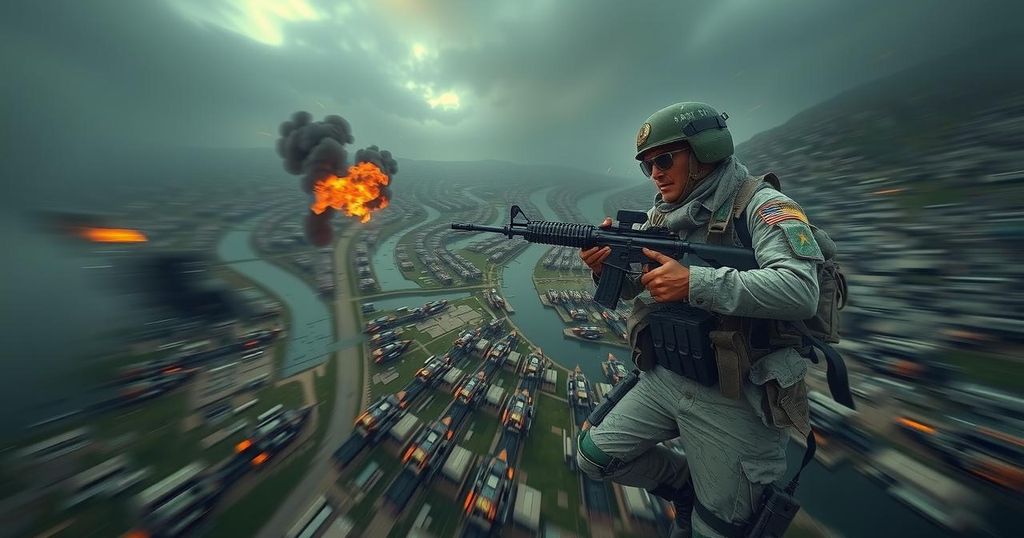Iranian-backed Iraqi militias have entered Syria to aid the Syrian government against insurgents who captured Aleppo. Approximately 200 fighters crossed through Bou Kamal and are heading to reinforce the military’s efforts to reclaim control. Concurrent airstrikes by Syrian and Russian forces have resulted in civilian deaths, escalating the humanitarian crisis. Iranian officials reaffirmed support for Assad amid rising regional tensions.
Iranian-backed Iraqi militias have recently entered Syria with the objective of assisting the Syrian government in its counteroffensive against an unexpected insurgent takeover of Aleppo, the nation’s second-largest city. This deployment aims to reinforce the Syrian military as it endeavors to regain stability amidst the challenges posed by insurgent advances, particularly those led by the jihadi group Hayat Tahrir al-Sham (HTS).
The insurgents initiated a two-pronged onslaught on Aleppo last week, expanding their operations into the surrounding territories of Idlib and Hama provinces. In reaction, government forces established a fortified defensive line in northern Hama with a strategic aim to impede insurgent progress. Concurrently, targeted airstrikes were conducted on rebel-held locations, intensifying governmental efforts to reclaim control.
Approximately 200 Iraqi militia fighters reportedly crossed into Syria through the Bou Kamal border crossing, as per the Syrian Observatory for Human Rights, an organization monitoring the conflict. Traveling in pickup trucks, these fighters are reportedly heading to Aleppo to augment the Syrian army’s campaign against recent insurgent incursions. An anonymous militia official confirmed that Tehran-backed forces stationed in Syria have been mobilized, with further reinforcements continuing to flow into the region to support President Bashar al-Assad’s administration.
In a separate but related development, Syrian and Russian airstrikes targeted rebel-held regions within Hama and Idlib, further escalating military efforts to halt the insurgents’ advances. Tragically, civilian casualties have also emerged from these strikes, with reports indicating at least ten civilian lives lost in the Idlib area.
Iran’s support for the Assad regime remains firm, as demonstrated by the meeting between Iranian Foreign Minister Abbas Araghchi and President Assad last Sunday, during which Araghchi affirmed Iran’s strong backing for the Syrian government amidst mounting tensions in the region. Following this crucial meeting, he proceeded to Ankara for discussions with Turkish officials regarding the ongoing conflict’s multifaceted dynamics.
While the insurgents announced ambitions to advance toward Damascus, the situation in the Syrian capital appeared relatively stable, precluding signs of widespread panic. However, the atmosphere in southeastern Aleppo diverged significantly, as many residents attempted to flee the fighting, leading to traffic congestion and fuel shortages in the area. The intensified conflict has raised alarms regarding a potential destabilization of the region, already fraught with tensions due to ongoing conflicts involving Israel, Hamas, and Hezbollah, and raises the risk of entangling Russia and Turkey in increasing hostilities as their interests collide in Syria.
The current situation in Syria highlights the ongoing complexity of the civil war that has persisted since 2011, initially sparked by protests against President Bashar al-Assad’s regime. Various international and regional actors, including Iran, have become heavily involved, often backing different factions vying for control. The entrance of Iranian-backed Iraqi militias into the conflict represents a continuation of Tehran’s longstanding support for Assad’s government, reflecting the regime’s reliance on foreign military assistance to combat advancing insurgents. This has further implications for regional stability, particularly as the conflict risks drawing in other powers like Russia and Turkey, who have conflicting interests in the region.
In conclusion, the involvement of Iranian-backed Iraqi forces in Syria to support Assad’s government illustrates the persistence of foreign influence in the ongoing Syrian conflict. The unexpected insurgent advances, chiefly from HTS, complicate the situation further, potentially leading to broader regional instability. Recent developments, including intensified military operations and civilian casualties, underscore the continuing humanitarian crisis in Syria. The interplay of various actors further exemplifies the challenges in achieving peace and stability in a region plagued with conflict.
Original Source: www.newsweek.com






